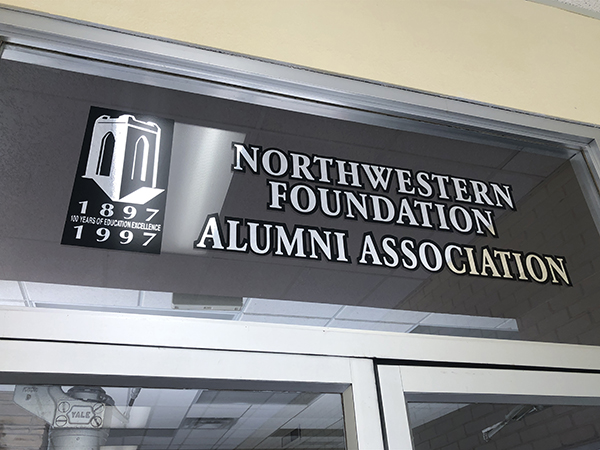Foundation office works with alumni to help students pay for education
By AUSTIN MORTON & JARA REEDER, Student Reporters

Without the Northwestern Foundation & Alumni Association, students like Noah Voth aren’t sure how they’d pay for their college education.
Voth, a sophomore education major, is a recipient of the Lavonn Meier-McKnight Memorial Scholarship, which is funded by the foundation.
“Having this scholarship has helped me be able to pay for school without worry,” Voth said. “And it has helped to keep me motivated throughout my time here.”
Voth is one of hundreds of Northwestern students who has received a scholarship from the foundation, which continues to provide financial support to students by working with community members and alumni to help Rangers obtain higher learning.
WHAT IS THE
FOUNDATION?
The foundation works with university alumni, businesses and other organizations to establish and fund scholarships for Northwestern, often dedicating those scholarships to a specific degree program or type of student.
Skeeter Bird, the foundation’s CEO, works with potential donors to establish relationships that will ultimately benefit students, he said.
Establishing those relationships can take time, he added.
“The process for the foundation can take anywhere up to 18 months,” Bird said. “We want to make sure that the donors are passionate about the scholarships they help create.”
Once the foundation has talked with a donor, the next step is to determine how much money will be donated. Then, the foundation and donors decide what kind of scholarship to create.
TYPES OF SCHOLARSHIPS
The foundation invests scholarship funds either in an endowment scholarship or a pass-through scholarship.
In an endowment scholarship, money is put into a savings account to accrue interest year-over-year. The amount of interest accumulated is then used to fund the scholarship. It’s also possible to add donations to pre-existing scholarships to increase the amount that can be given each year.
If an endowment scholarship is created with $20,000, a few thousand dollars will be available in scholarships each year, Bird said.
The largest endowment the foundation has is the RISE Scholarship, which stands for Rangers Investing in Scholarships and Education. Bird created it in 2006 shortly after he started working for the foundation.
When donors don’t have a particular interest in where their money goes, it’s put into the RISE Scholarship, which has a balance of $1.3 million.
“It’s never enough,” Bird said. “We want to be able to offer as many scholarships as possible, and even though I am thankful for what we have, there is always room for more.”
A pass-through scholarship does not build up interest, but it tends to fund more scholarships. If a donor wants their money to be given to students immediately, it will be put in a pass-through scholarship program. To stretch out the lifetime of the donation, the foundation attempts to break up how the money is dispersed, Bird said.
The foundation does not put a cap on the amount of money a student can receive. As long as a student meets the qualifications for a scholarship and is chosen to receive it, the student will receive the full amount of money, Bird said.
Through the alumni association, the foundation is able to contact alumni and community members who may be interested in donating, Bird said.
“It is honestly kind of like dating,” Bird said. “We actively seek out possible donations.”
FOCUSING ON FUNDING
The foundation funds around 300 scholarships each year, helping students pay for their degrees while taking out fewer student loans. Roughly 52% of all Northwestern students graduate without debt, and more than 80% receive scholarships, Bird said.
The number of scholarships awarded annually fluctuates, Bird said.
Some older scholarships may lose funding, while new ones are created. Nearly all of the foundation’s scholarships are named after community members, alumni, faculty and others who invested in Northwestern.
A $3 million donation in 2020 from the estate of a community member was the largest the foundation has ever received, Bird said.
Foundation employees’ salaries are based on how much the foundation receives in donations, incentivizing them to put students first, Bird said.
‘MEANINGFUL BONDS’
Kennedy Mount, who serves as the relationship manager for the foundation, works with donors to show them the value of supporting the university.
“I work to create meaningful bonds with our donors,” Mount said. “It’s more than just money being thrown to us.”
Mount also helps with community outreach projects such as the annual Thank-A-Thon, where students write letters to the donors of the scholarships they receive. This is used to help show the donors that their investments are actually aiding the students on campus, she said.
“Ensuring that the donors feel positively and strongly about why they donate helps foster that growth that we need for the scholarships,” Mount said. “We really just want to help students in the best way possible.”
IMPACT ON STUDENTS
That work pays off and benefits students in the long-run, foundation leaders and students say. Britni Stewart, a senior agriculture education major, received the Wisdom Family Foundation Agriculture Education Scholarship. Stewart will graduate in May, and she attributes her doing so largely to the foundation.
“I am very appreciative of the foundation and what they do,” Stewart said. “Without them, I would not be able to be where I am today. These scholarships have helped me fund my college education and allowed me to continue my education at NWOSU.”
Getting students to the graduation stage is just the final step in the foundation’s work. Some of its scholarships are the reason students say they became Rangers.
“Having the scholarships did make the decision easy, knowing I was going to receive scholarships to aid me throughout college,” Voth said. “I think it’s impressive what the foundation is able to do. It shows that the community around Alva does care about the students here.”
